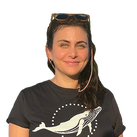I’m set to board Greenpeace’s Arctic Sunrise ship and expose the threats to our oceans
Climate column: As a doctor, the pandemic has taught me how interlinked and precarious our health and life-support systems are – that includes our oceans


Your support helps us to tell the story
From reproductive rights to climate change to Big Tech, The Independent is on the ground when the story is developing. Whether it's investigating the financials of Elon Musk's pro-Trump PAC or producing our latest documentary, 'The A Word', which shines a light on the American women fighting for reproductive rights, we know how important it is to parse out the facts from the messaging.
At such a critical moment in US history, we need reporters on the ground. Your donation allows us to keep sending journalists to speak to both sides of the story.
The Independent is trusted by Americans across the entire political spectrum. And unlike many other quality news outlets, we choose not to lock Americans out of our reporting and analysis with paywalls. We believe quality journalism should be available to everyone, paid for by those who can afford it.
Your support makes all the difference.A couple of weeks ago I opened my emails to find one from Greenpeace International, asking if I could be the onboard medic for their ship, Arctic Sunrise.
The two days that I had to accept the post had me experiencing a range of emotions that had been largely suppressed during a year of lockdown: excitement and anticipation, to deep-belly anxiety running through the worst-case scenarios that I might manage as a solo doctor for a crew isolated on the high seas. But, it was also perfect timing. I’d just finished my contract working as a doctor in East London, and my new job as an academic researching how climate change interacts with migration and health was both flexible and aligned with Greenpeace’s work.
The Greenpeace ship Arctic Sunrise is in the Indian Ocean documenting and exposing the threats our oceans face. This area is home to incredible wildlife and ecosystems – from pygmy blue whales and dugongs to colourful coral reefs and the largest seagrass meadow in the world. Such ecosystems play an important role in supporting local communities and in our global fight against the climate crisis, but they’re threatened by industrial fishing. Less than 1 per cent of global oceans are effectively protected from destructive fisheries and other harm. We’ll be heading to an area uniquely rich in life, to witness and highlight the failures in safeguarding our oceans.
The Indian Ocean is also home to millions of people living on low-lying coastal areas that rely on the ocean for their food and livelihoods. I’m currently in quarantine on an island in the Seychelles, which could be hard hit by sea-level rise, coastal erosion, flooding and an intensification of extreme weather events, despite having done very little to contribute to the greenhouse gas emissions that are driving such climatic changes.
Read more:
From the short time I’ve been here, I can tell you it’s a beautiful and abundant place made more so by its palpable precariousness. The United Nations’ Global Ocean Treaty negotiations and the 26th Climate Conference (Cop26) are set to take place in 2021, and with the lessons of the Covid-19 pandemic to not return to normal but “Build Back Better”, it is both imperative and timely that those of us with power, act to mitigate the worst. As a doctor, the pandemic has taught me how interlinked and precarious our health and life-support systems are – that includes our oceans.
I’ll be joining Arctic Sunrise this week, after 10 days of quarantine, two Covid-19 PCR tests, a rapidly sought seafarers medical certificate, and the acquisition of some much-needed seasickness tablets. A week ago I couldn’t have told you the difference between port and starboard; now I’m tying bowlines and half hitches without a second thought.
Along with our onboard team of photographers and videographers, I’ll explore how our oceans are inextricably bound to our health, looking at the impact of overfishing, plastics, extreme events and sea-level rise, and how our oceans support us in our fight against the climate crisis, as well as keeping you afloat on our activities aboard the Arctic Sunrise for The Independent.
Dr Rita Issa is an NHS GP and onboard medic for Greenpeace’s boat Arctic Sunrise
Join our commenting forum
Join thought-provoking conversations, follow other Independent readers and see their replies
Comments